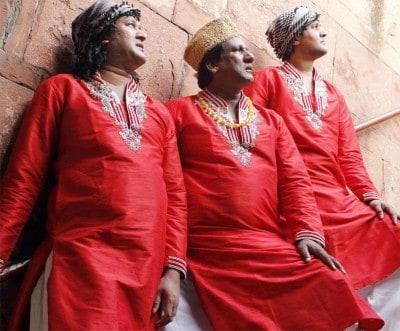By Sukant Deepak
New Delhi, Aug 27 : He talks about the sudden quiet at the dargah of Nizamuddin Auliya — his home of the world. And sleepwalking with the lonely where thousands came everyday… For someone who belongs to a 750-year-old tradition of qawwals there, it feels strange not to witness the audience who would come to hear him seek blessings from Hazrat Nizamuddin and Amir Khusrao — pushing his voice to the boundaries, and not caring where the edge is.
“I just hope that things get back to normal soon. Of course, it is depressing not to be able to sing in that courtyard. We may have performed at the most prestigious venues in India and abroad; but while facing the dargah, everything else ceases to be. Nothing else matters. Of course, we understand that in these times of the pandemic, it is important that experts’ advice be taken seriously and all rules followed,” said Chand Nizami, the lead singer in the Sufi band, ‘Nizami Bandhu’, who started singing at the age of six and shot to popular fame after his song ‘Kun Faya Kun’ from the movie ‘Rockstar’ in 2011.
Bandhu, who belongs to the Sikandra Gharana, one of the very few where qawwali and classical co-exist, with elements of Khayal gayaki in it, added, “Whenever we sing, the spiritual element is always intact and the classical touch is hard to miss. This includes our songs for films like ‘Rockstar’, ‘Bajrangi Bhaijan’, ‘Yahaan’ and ‘Azamgarh’. We make it a point not to sing new-age songs in the garb of Sufi.”
Credited for making Sufi more ‘accessible’, Bandhu feels that it is important for them that their music reaches everywhere, cutting across all barriers. “Why should anyone be deprived of it — be it the audiences in auditoriums, those visiting dargahs or for that matter movie goers as long as the essence is not diluted.”
Stressing that music director AR Rehman has been instrumental in giving qawwali its due place in mainstream cinema, Nizami said, “Yes, music directors like Naushad Ali have done that before, but in the past few decades, it would mostly be about a competition between a man and a woman. That was almost bizarre. Rahman has understood its reach, and what it can do to a film’s narrative.”
Smiling that the past few months have only been about riyaaz as no performances are taking place, Nizami says that even during the peak of his concerts, he manages to squeeze out time for practice. “One needs to consistently do that to evolve. When I started out, it used to be around 10 hours everyday. Even now, I try devoting at least three hours.”
Nizami Bandhus, who will be seen in HCL Digital Concerts soon, feel that such initiatives during these times are extremely important for both listeners and musicians. “There is a certain underlying depression due to restricted movement and absence of any kind of activity. For musicians like us, who survive on nothing but our art, they have become indispensable. I hope other major corporates also follow suit and do their bit for art and artistes.”
Disclaimer: This story is auto-generated from IANS service.

